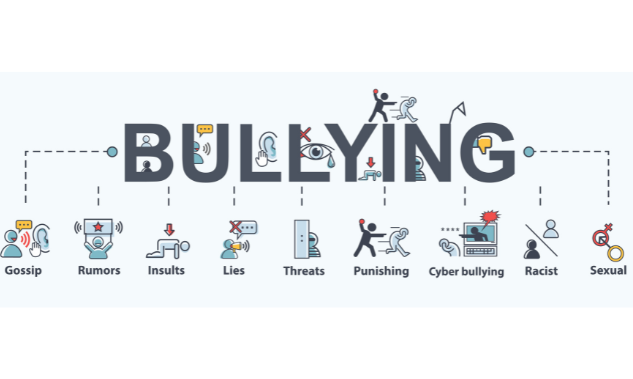It’s every parent’s worst nightmare. Their child comes home in tears or, maybe even worse, unwilling to talk about something that is obviously bothering them. Bullying manifests itself in many ways, and each child deals with it in a different way. Some are noticeably affected, others bury it deep down inside. Some are willing to discuss the situation or at least allow their emotions to surface, others remain quiet–unwilling or unable to share their pain, instead allowing it to eat away at them until it can no longer be contained.
As a parent, there’s nothing quite as difficult as witnessing your child in such pain (either emotional, physical, or both) and feeling helpless about the situation. But you’re not helpless, and neither is your child. In fact, there are certain things you can do to help your child deal with bullying at school.
What Is Bullying?
To help your child deal with bullying, you first have to understand exactly what bullying is. Most kids, at some point in their lives, are teased or picked on to some extent. But it’s not truly bullying until it turns into intentional tormenting through physical, verbal, or psychological ways. Bullying can involve name-calling, threatening, mocking, insulting, and, of course, hitting, shoving, or kicking. Many times, bullies attempt to take things from their targets, using the bullying as the means to that end.
But bullying can also come in less visible, subtler forms–through intentional shunning or exclusion, by spreading false rumors, and through cyberbullying, which involves bullies using social media or texts to taunt or humiliate their targets. This isn’t our parents’ bullying, where some neighborhood or schoolyard delinquent grabbed an unsuspecting victim and bent their arm backward until he or she yelled, “UNCLE!” Sure, incidents like these still occur, but today’s bullying is far more nuanced and, arguably, dangerous.

Bullying By the Numbers
We’re seemingly near the end of a global pandemic, but bullying is one that never seems to go away. According to statistics provided by StopBullying.gov:
- About 20% of students ages 12 to 18 experienced bullying nationwide.
- Students ages 12 to 18 who reported being bullied said those who bullied them:
- Had the ability to influence other students’ perception of them (56%)
- Had more social influence (50%)
- Were physically stronger or larger (40%)
- Had more money (31%)
- The following percentages of students ages 12 to 18 had experienced bullying in various places at school:
- Hallway or stairwell (43.4%)
- Classroom (42.1%)
- Cafeteria (26.8%)
- Outside on school grounds (21.9%)
- Online or text (15.3%)
- Bathroom or locker room (12.1%)
- Somewhere else in the school building (2.1%)
- Approximately 46% of students ages 12 to 18 bullied during the school year notified an adult at school about the bullying.
- Among students ages 12 to 18 who reported being bullied at school during the school year, 15% were bullied online or by text.
- Students ages 12 to 18 experienced various types of bullying, including:
- Being the subject of rumors or lies (13.4%)
- Being made fun of, called names, or insulted (13%)
- Pushed, shoved, tripped, or spit on (5.3%)
- Leaving out/exclusion (5.2%)
- Threatened with harm (3.9%)
- Others tried to make them do things they did not want to do (1.9%)
- Property destroyed on purpose (1.4%)
The numbers don’t lie. Bullying is a real issue affecting millions of children around the world. So, how do you know if your child has been bullied? Here are seven signs:
- Unexplained cuts, bruises, or scrapes
- Lost toys, school supplies, clothing, lunch, or money
- Fear of riding the school bus or being left alone
- Change in typical behavior or personality
- Physical complaints or ailments like headaches and stomachaches that result in frequent visits to the school nurse
- Changes in eating habits
- Sudden and significant drop in grades
What can you do if you notice these signs?
How Parents Can Help Their Kids Deal with Bullying
Getting your bullied child through this difficult time requires work. There’s no magic wand to wave that eliminates the bully and restores peace and order. It’s complicated and there are many factors to consider–making one wrong move might make the bullying situation exponentially worse for your child, and that’s certainly something we’d all like to avoid.
Take it seriously. You don’t necessarily want to overreact to the situation (parents seeking vigilante justice against someone else’s child is not the solution, as tempting as that instinctual reaction might seem)–but you don’t want to brush it aside as if it’s not a big deal. It’s obviously a very big deal to your child. Bullying not only hurts physically, but it damages a child’s sense of comfort and safety and takes a major toll on their self-esteem. Research indicates that persistent bullying can lead to or worsen feelings of isolation, rejection, exclusion, and despair, as well as depression and anxiety, which can contribute to suicidal behavior. As a parent, listen to your child and offer comfort. That’s what they need first and foremost.
Reassure your child. Targets of bullies often experience a wide range of emotions. They may think it’s their fault, they might feel embarrassed, they may be worried about repercussions. At this moment, it’s critical to ensure your child that this is not their fault and that nothing they did caused this unfortunate situation. Take the time to explain that it’s the bully who has the issues and problems, not your child–he or she did nothing wrong, or certainly nothing to warrant the abuse they’re experiencing at the hands of a bully.
Intervene. Again, this does not involve the parents seeking revenge against the bully…or even the bully’s parents. While not intended to be a blanket statement, bullies are often bullies for a reason (or several reasons)–and that tends to trickle down from their own parents in some way, shape, or form. It could be lack of attention, it could be child abuse (mental, verbal, physical, or a combination), it could be that one or both parents is a bully him/herself, or it could be that the bully was simply dealt a rotten hand and takes out his or her frustrations on others.
Regardless, as a parent, you need to do something. If the bullying is occurring at school or on school grounds (the bus counts as school grounds), notify the school immediately. Many schools have bullying “hotlines” or website forms that allow parents and students to make the school aware of the incident(s)–most schools take bullying very seriously and will act quickly. The process generally involves an investigation into the allegation, so having some tangible evidence of the bullying is very helpful. That could be in the form of texts, social media posts, photos, videos, eyewitnesses, and even surveillance footage from the school property or buses. The school should be able to take things from there and rectify the situation–without repercussions or retaliation–thanks to anti-bullying programs and laws.

Preach non-violence. Your child is hurting–it’s natural for a parent to react by telling their child to fight back physically. An eye for an eye, right? That may sound ideal in theory. In reality? Not so much. Because all that will do is lead to more abuse, more violence, and more fighting…which is probably what the bully wants anyway. In that scenario, the bully wins and your child loses in more than one way–not only is your child still receiving the abuse, but he or she will also get in trouble for fighting.
When bullies know they have the upper hand and are getting a reaction from their target, it’s like fuel that keeps their engines running. The best way to beat back bullies? Ignore them. It’s easier said than done–after all, human emotions are involved, and sometimes physical retaliation is the impulsive action that creeps into our heads. But if your child knows in the back of their mind that showing bullies their insults and hostility aren’t affecting them whatsoever, that’s when the bully shows signs of defeat.
Provide sound advice. As parents, it’s our job to guide our kids with words of wisdom and advice that they hopefully use to navigate the right path. When it comes to bullying, there are several tips we can offer our kids. Keep in mind, they may not all work, but they’re worth discussing and trying. In many instances, avoidance can be effective. Talk to your child about where and when the bullying is most often occuring–there may be ways to avoid the situation completely.
If the bullying is happening on the school bus, see if your child can change seats–or, maybe it’s best if they just don’t ride the bus at all. If it’s taking place in the hallways or at lunch, perhaps you can suggest they take a different route or sit somewhere else. Or have them make sure they’re with a friend at all times so there’s less of a chance to be ambushed alone. These are undoubtedly inconveniences to your child, ones that they shouldn’t have to accept. But given the situation, it’s the lesser of two evils.
You can also teach your child how to remain calm and not show emotion in the event of an encounter with the bully. Bullies feed off of their victims’ fear and tears, so have your child take some deep breaths, maybe count to 10, and then walk away. Sometimes an unexpected reaction can throw off a bully too–like laughing at the insult before turning and leaving; making a sarcastic quip in response; or even just smiling. These responses can leave a bully at a loss for words (which is the idea!) or just cause confusion. And, with reactions such as these, it shows the bully that you’re not really fazed by their actions. That’s usually when they give up and move onto the next target. Which brings us to…
Encourage your child to stand up for others. Once your child feels confident and courageous enough to stand up to his or her bully, you should encourage them to do the same for other victims who may be experiencing the same struggles. Again, this doesn’t mean resorting to physicality–simply standing by a friend (literally) in a show of unity sends the bully the message that it’s not going to be so easy this time around. Plus, it’s part of being a good friend and doing the right thing.
Consider homeschooling. Doing so does not mean you’re running from the situation. Sometimes bullying can get so out of hand that families have no other options but to remove their child from a toxic and dangerous situation. The bottom line is, parents need to do what’s best for their children. That often necessitates a change of scenery. Many bullied schoolchildren reach the point where they no longer care about their education–because school equals misery to them. School means torment and abuse, anger and sadness. They begin to associate only negative emotions and feelings with school. And this harms children in so many ways. Their education suffers, their personalities change, and their futures suddenly don’t seem as bright. These are things parents want to avoid at all costs, and homeschooling can certainly be a life-changer.
Homeschooling removes bullied students from a precarious situation and offers children time to heal. Taking your child out of the environment in which he or she suffered every day will be a huge sigh of relief. Waking up each morning knowing that they won’t have to face whatever they had been dealing with can instantly eliminate stress for the entire family. Plus, it gives your child time to emotionally recover from the trauma they’ve endured at the hands of their bully. This time is important, as it allows your child to reset their minds from both an emotional and academic standpoint.
More and more families have turned to homeschooling in recent years for a variety of reasons–but bullying is often near the top of the list. This means you’re not alone and your child is not alone. There are so many benefits to homeschooling, besides not having to deal with bullies anymore. Flexibility, personalization of your child’s education, socialization (yes, homeschooled kids do socialize quite actively, through co-ops, homeschool groups, community service, and extracurricular activities!). If you’re thinking of giving homeschooling a try, check out this additional resource from Bridgeway on getting started!
Rebuild their confidence and make school fun again. Homeschooling can certainly expedite this process. By giving your child the right environment for them to succeed, they’ll work their way back into a school mindset, enjoy learning once again, experience academic success, and rebuild their confidence and curiosity to learn.
Bridgeway Academy is here to help. To learn more about how we can provide the education experience you’re seeking for your child, call us at 1-800-863-1474 to speak with a homeschool expert.







